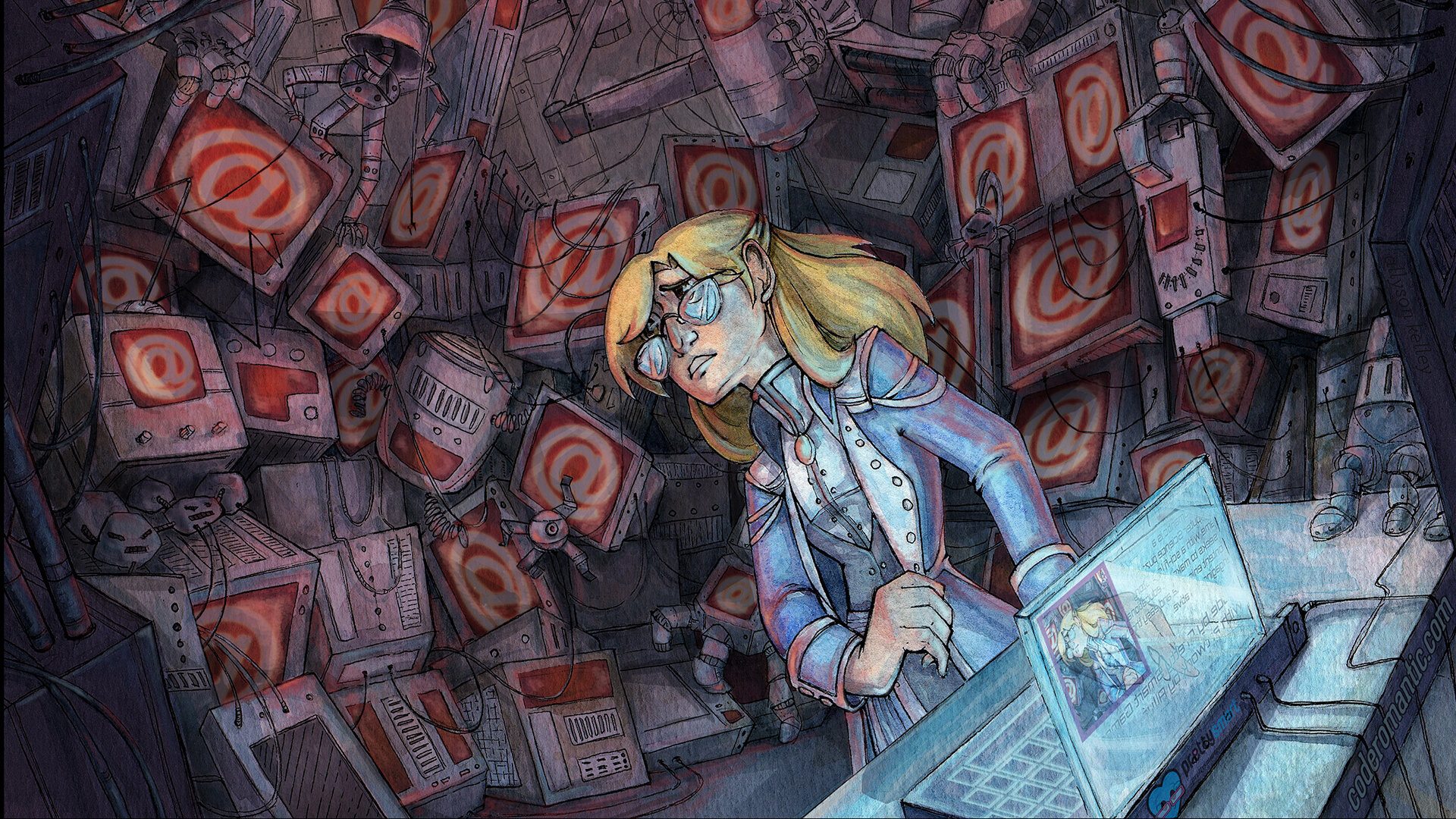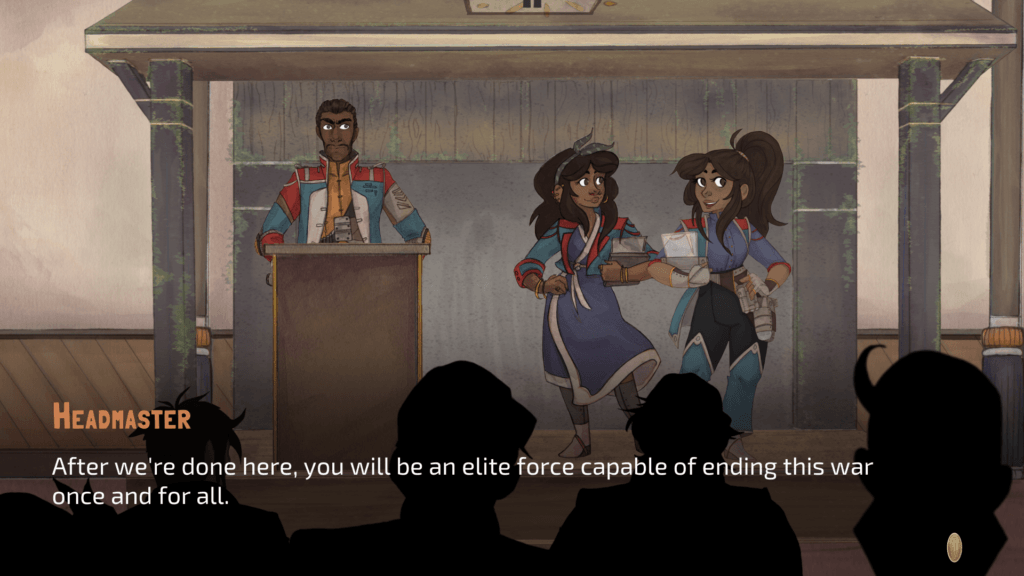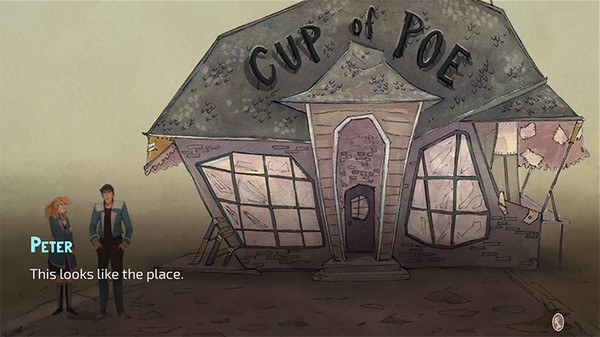Publisher: Pretty Smart Games / Developer: Pretty Smart Games / Platform: Steam, Itch.io / Release Date: April 30, 2020
Can you learn from gaming? It’s an age-old question and in my studies, I’ve found that you can learn a thing or two from games designed to teach or at least use them as an introductory tool into specific subjects. Code Romantic is one of those games that attempts to gamify learning – in this case, the subject of coding. It’s a tough subject but one that developers Pretty Smart Games attempt to make less intimidating through the backdrop of a post-apocalyptic world mixed in with a little romance.
Does this visual novel succeed? Well, yes and no. Code Romantic isn’t going to have you coding your own games or hacking into computers just yet. However, it tries its damnedest to help you understand the subject of coding and make it less intimidating.
Story
Code Romantic has a fun premise going for it. You play as Mina Lovelace, a young girl in a world where machines known as @ware have gained sentience and taken over the internet. At a young age, Mina’s mother taught her how to code in order to hack and defend herself against the @ware. The game begins with an older Mina being drafted by the Human Defense Department into a special academy in order to be the last defense against the rampant machines.
Interestingly, even though Code Romantic is a post-apocalyptic world torn apart by machines, it’s nothing too dark or violent. Its narrative actually plays more like a slice of life than a YA post-apocalypse. The game is a pretty leisure adventure, and sometimes the drama is outweighed by the levity and the backgrounds of the core cast can be overshadowed by that as well. Playing through the game, it even feels like the stakes never really get too high until the very end.
What Pretty Smart Games does well is interweaving the game’s premise with its focus, teaching code. Most games that teach are usually very blunt about injecting their subject into the game’s world. However, in Code Romantic, learning to code and making it the core gameplay feels natural to the game’s overall narrative. The characters even seamlessly introduce vocabulary and code without it feeling out of place.
Another great aspect of the story is the characters and the main romance. The other academy students are a fun group of people, with each of them having their own unique personalities. Even if the drama can seem fleeting, it’s great to watch the characters interact. The writing has a lot of quirky qualities to it with the cast being likable, but it’s really the romance that takes the center stage. It’s cute, and the chemistry between Mina and her love interest is good stuff the leaves you invested in their development. It also helps that the flirting and teasing are so dang adorable.
Presentation
If I had to compare Code Romantic to anything, it would be more like a child’s storybook. The art takes on that style as well and that’s thanks in part to artist Allyson Kelly. The character designs are very well done and matched with beautifully drawn backdrops. Just about all of the game takes place in the academy which in this world is a repurposed literary-themed amusement park. It’s an amusing setting that the game fully takes advantage of and has fun with. The music is also a nice touch, with its pleasing melodies and distinct dramatic scores. My only critic is the animations. They can be rough as characters move in and out of scenes. It’s a minor issue but not too distracting or noticeable.
Gameplay
Code Romantic leans on the more linear side of visual novels, meaning there aren’t any branching pathways or choice-based gameplay involved. Which is understandable. The game uses its visual novel elements strictly for narrative purposes and storytelling. I do wish that the game would let players make conversation choices though. Nothing that impacts the story but something that opens up the dialogue between the other characters.
Where the gameplay really devotes its attention is to teaching code. All of the subject matter is based on introductory Computer Science material. The main form of code that the game aims to teach is C# through code-based puzzles. Each puzzle introduces an aspect of code to you and then ask the players to apply it. How this works is the player is given actual code with several spots missing. Players click on those spots to reveal several possible options and find the right one.
The game does it’s best to help you understand, and that’s where it shines. Before each level, the characters introduce and show players the principles for how certain concepts work. They also provide a useful tool to help the player understand every aspect of the code. For example, you can click on any part of the code, and the window on the side of the screen will tell what it means and how it works. Even when you fail to input the right code, characters will explain what might have gone wrong to help you fix the problem.
It’s a lot of trial and error, and that’s the game’s biggest obstacle – the subject matter itself. Coding isn’t easy and it’s a tough subject that, as the game puts itself, is like learning a different language. I found myself often trying to wrap my brain around how to piece it together to no avail, even as the game tried to explain how it works. Once again, it’s not a fault of the game but the subject. What does work is that the more I played, the more I begin to see the patterns in how the code worked and begin to grasp some of its concepts. It also helps that there are some fun riddles in between each chapter to break up the pacing.
Summary
I feel like Code Romantic succeeds in introducing the core concepts of coding. Can it teach the subject on its own? No, but it does feel like the perfect companion to say maybe a Computer Science 101 class. In a classroom setting, Code Romantic would really shine, and I feel the player would have an easier time understand the subject. I was even surprised at how much did understand by the end of the game. Add in a story filled with great art and likable characters and I feel like Pretty Smart Games has accomplished its goal of making coding a lot easier to get into.
Want to get Black Nerd Problems updates sent directly to you? Sign up here!
Follow us on Twitter, Facebook and Instagram!








Show Comments